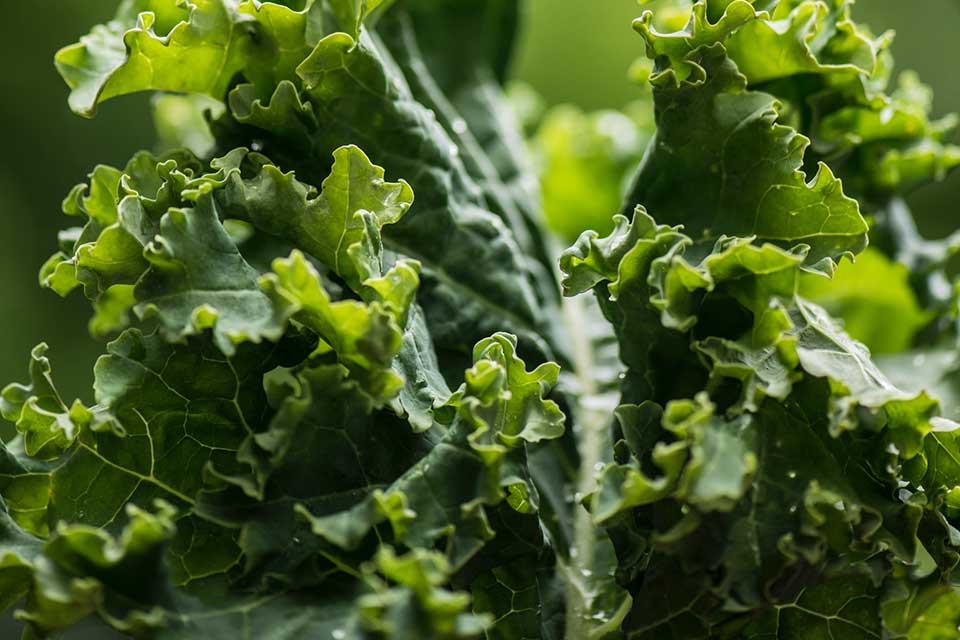Ode to Kale

Series editor’s note: What does it mean for a body to remember its feeding, to have to reckon with its darkest days, days spent eating weeds in the aftermath of a genocide? And what does it mean for the body to choose to harm itself, by eating anything to make it whole, to forget what it once saw, what it once experienced without its permission? These are the questions that Hope Wabuke tackles with her poem “Ode to Kale,” tracing masterfully the intergenerational trauma in her family, creating worlds upon worlds that collide and expand, creating more room for the speaker to tend to her son. Wabuke’s acquired lexicon is as complex as it is both new and ancient, and she uses kale as a way to navigate this knowing our bodies are filled with, the knowing of things rotting inside, the knowing of violence erupting all around us, the knowing that the world is constantly at war with our bodies, one way or another. But there is tenderness here too, as the speaker tends to their own and, by extension, tends to us—for a mother who suffocates the piercing sound of gunshots by making a kale smoothie is one that knows well how to shield her son, how to shield us from the world that kills and feeds us weeds afterward. – Mahtem Shiferraw
Ode to Kale
by Hope Wabuke
when my son is young I make him
kale popsicles: one pound of kale
shredded ginger lemon squeezed apples & water blended
he eats them two in hand as fast as they come
but I cannot take credit recipe copied from his favorite juice
bar in long beach california where we
would sit before catching the bus
back to the domestic violence shelter where we lived
that first year of his life our windowless tiny apartment after that—god
how my mother was so proud of my fighting back
to the surface in tiny little motions prouder than
she has ever been of me in my whole life
as if she could applaud in me something she could never
name in her own being
but we never saw any other brothers & sisters at the juice bar
even though we saw them next to us on the bus & through its windows
to other places like kfc & outside after dark
when gunshots & cruising took over the farmer’s market greened streets
shaking the veterans & other shattered survivors awake
& I would turn my blender loud with kale &
add to everything blend again
my mother hates
kale she says because after that gun-splattered night
they escaped from the dictator & his genocides
kale grew everywhere like a weed she says & they ate it for days
breakfast lunch dinner she says organic & locally sourced from
the camp yard or the side of the road & so
when she got here my mother worked in school kitchens & ate
what the kids were given & thought them delicacies—mega muffins & giant cookies
fruit jelly popovers juices & syrups &
hamburgers & fries & five different kinds of pizzas & sugar &
her body used to vegetables beans & lean meats could not
take it but kept trying until now the diabetes
spread the heart attack scarring
spread she is all the american sicknesses fed; fermented
—& what does this say about a country that does that to its kids
by the way—
& then medicated my father also married to stress
in the myth of advancement through horation work ethic
until there is nothing left when there is nothing
left kale is good for you I tell my mother it will help you
feel better but she will not eat it here, kale is a delicacy I tell her
a hipster organic treat at whole foods higher priced
per pound than the special coffee or cuts of meat she enjoys but
no she says then & again even when I feel
my own heart stutter after my son’s birth when I have
become so busy that I do not take care of myself
I eat fast on the run do not exercise &
I lose my balance dizzy spinning light-headed only understanding one thing:
this is how you are going to die your heart
like your mother is going to die
& I start to eat kale & other things beloved back
home as if I could eat enough for the both of us mom I tell her
no she tells me it is a weed the starving eat
in kenya & I will not
my mother is already dead or we know how
my mother will die each tiny growth of scar tissue encroaching
with each pump of the tiny slick red bulb in the 6 years since the first
surgery now half way across & still we do not talk about
how we do not do math how we are silent
this is how you deny your mother is dying &
to everything: what is the point—
kale will not stop it now even when I make my mother’s peanut stew
& matoke & I sneak in the rich handfuls of leafed green
life my sister always asking mom, please
her voice enough like mine to make me think
for a minute it is me speaking instead even though I do not know
what either of us would plead for anymore so
I tell my sister it is not hard to make if I can make it she can but
she brushes me off the point I suppose not in the eating of the matoke & peanut stew
but in the wanting of mama whole again making her stew in the kitchen &
us unaware & small our whole world held in mother’s body
on just another unremarkable day when we would all wake up
& all go to sleep & then all wake up again
Editorial note: Black Voices is a special series guest-edited by Mahtem Shiferraw and sponsored by the WLT Puterbaugh Endowment, which makes possible the biennial Puterbaugh Lit Fest. The series will run on a weekly basis through August 2020.











